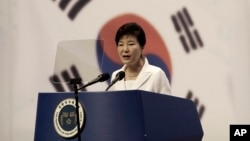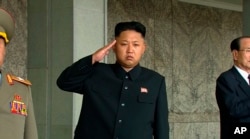South Korean President Park Geun-hye has yet to decide on whether or not she will accept China’s invitation to attend celebrations in Beijing to mark the end of World War II early next month.
“We are reviewing the issue of President Park's attendance of the Victory Day event on September 3rd, considering various matters, and will announce our position in the near future,” said South Korean Foreign Ministry Spokesman Noh Kwang-il on Tuesday.
Seoul’s Foreign Ministry and the White House denied reports that the United States was pressuring President Park to decline the visit to avoid the appearance of favoring Beijing over Washington.
But the country’s main opposition party is urging President Park to attend, saying Seoul needs to be more proactive in engaging with China and with North Korea.
“We must take the initiative in diplomacy rather than being dragged by others,” said Moon Jae-in, the leader of the New Politics Alliance of Democracy.
More sticks, few carrots for North
The South Korean opposition leader also criticized President Park for maintaining harsh economic sanctions against North Korea.
The sanctions against the North were imposed in 2010 after the sinking of a South Korean warship that killed 46 sailors. Moon argues that measures actually punish the South by limiting economic outreach to North, increasing Pyongyang’s dependence on Beijing, and worsening tensions on the Korean peninsula.
Inter-Korean tensions have increased after Seoul accused Pyongyang of recently planting landmines that injured two South Korean soldiers in the border area’s demilitarized zone.
North Korea denied responsibility and threatened to carry out "indiscriminate strikes" on South Korea. Seoul has also increased military readiness as it begins a series of joint military drills with U.S. forces.
At the same time, President Park has reached out to the Kim Jong Un regime to re-establish trust by working together on facilitating reunions for families separated since the end of the Korean War. This week the countries also struck an agreement to raise wages at a joint industrial park by 5 percent.
Balancing ties between Washington and Beijing
The military alliance between Washington and Seoul has been strong and close during Park’s administration. Both sides support the “strategic patience” policy of strong sanctions and military deterrence until Pyongyang halts it nuclear weapons development program and agrees to international peace talks.
Economic and diplomatic relations between Seoul and Beijing have also greatly improved during President Park’s time in office. China is now South Korea’s biggest trading partner. The trade volume between the two Asian neighbors, over $200 billion, is more than double the volume between South Korea and the U.S.
Some Western countries have expressed concerns that Beijing may use the event to publicly shame Japan for past wartime atrocities and put on a display of military might rather than celebrate peace and reconciliation.
Japanese Prime Minister Shinzo Abe’s expressions of remorse during his WWII anniversary speech fell short of meeting China and South Korea’s expectations of a sincere apology. But President Park indicated she would focus on his promise to uphold apologies by past Japanese leaders and work to improve relations with Tokyo.
Reaching out to Kim Jong Un
There is a chance that Kim Jong Un could attend the Beijing event, even though China has not even officially confirmed that Kim was invited.
If he does go, that could create the opportunity for a sideline summit with South Korea’s leader, according to Woo Su-keun, a Korea analyst and political science professor at Donghua University in Shanghai
“As the two Koreas are not working well at this point, they can meet in a third country in this situation. I think we should take this opportunity to start over and resume talks between the two Koreas.”
Chances of Kim Jong Un attending still seem somewhat remote. There was speculation that he backed out of attending Moscow’s WWII celebration in May because he did not want to be received as merely one of many world leaders.
VOA Seoul Producer Youmi Kim contributed to this report.

